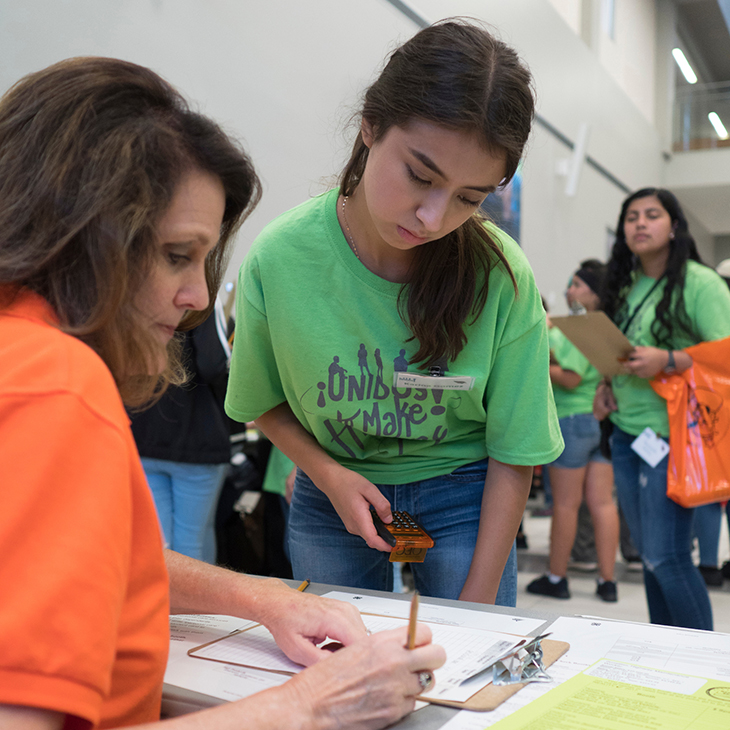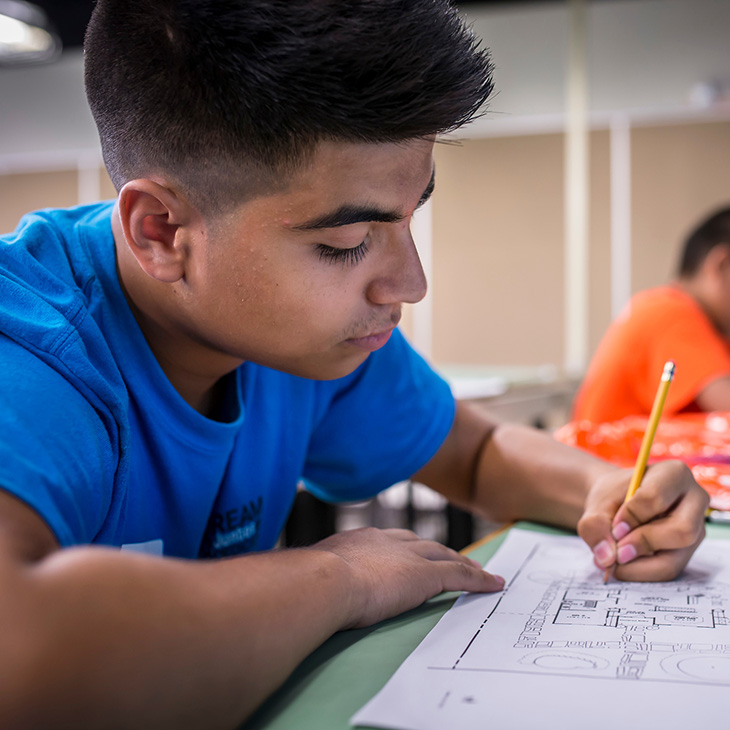
Fueling the future
Friday, October 26, 2018
It’s becoming a familiar scene at Oklahoma State University: Nearly 100 brightly-colored-t-shirt-wearing middle schoolers engaging in lots of highly interactive, hands-on, STEM-related activities across the Stillwater campus.
During this year’s two-day-one-night stay, they got a taste of everything from personal money management strategies, soil science and digital mapping technology to landscape architecture, jewelry making and psychology.
The students are part of Unidos Se Puede, a family-based program that helps Latino middle school students do better in school and stay away from drugs, teen pregnancy and other potential pitfalls.
For some, the summer event was the first time they’d ever set foot on a college campus. For all of them, it was a powerful glimpse into future possibilities they may have never considered.
“We know Unidos is having a positive impact on the youth and families participating in the program,” said Ronald B. Cox, Jr., the OSU associate research professor and Cooperative Extension specialist who developed the program. “Parents are more involved, their children are seeing and experiencing this increased involvement and are responding in a positive way.”
Turns out, it’s a pretty impressive list.
According to 2017 year-end reporting on the program, 98 percent of participants indicated they were satisfied with the program. Students also indicated significant increases in critical areas such as their confidence in their own abilities to solve problems and be successful, a positive attitude toward and engagement with school, prosocial behaviors such as helping people and parental involvement at school.

There also was a decrease in behavior problems in school and drug use.
In fact, Unidos is so effective Cox has been awarded a grant from the U.S. Department of Agriculture/National Institute of Food and Agriculture, to adapt and expand the program into the African-American community in north Tulsa.
In partnership with Langston University, Cox will pilot and test the new program, tabbed as United We Can, this spring before its debut next fall.
“We’re really excited because north Tulsa has traditionally been an underserved area of the city,” Cox said.
Unidos’ achievements are, of course, important in terms of helping Oklahoma students succeed academically, which in turn will set them up for bright futures.
But, the program’s success is crucial for others reasons, too. Demographic projections suggest 88 percent of the United States’ population growth over the next 50 years will come from immigration or the descendants of immigrants. Latinos are expected to make up a large segment of this population.
“It’s extremely important that we focus on this next generation of youth. These students are going to be tomorrow’s doctors, lawyers, engineers and landscapers. They need to be well prepared to meet the challenges or the whole nation will suffer,” Cox said.
Also, similar to Tulsa, urban areas all over the nation are struggling to ensure students are progressing academically.
“It’s an urban problem, primarily, where we have what some people call dropout factories,” he said. “We’re trying to change some of that and help kids get a new vision for why they should study.”
Unidos is based on three major components: family engagement, building students’ self-confidence and providing opportunities to build positive peer relationships. Since its launch in 2012, almost 500 students and their families have participated in Unidos.
Currently, it’s available at five Tulsa junior high schools, Nathan Hale, East Central, Edison, Will Rogers and Tulsa MET.
Funded by a separate grant from the USDA/NIFA, Unidos has evolved in a couple of key ways since it began.
For the second year in a row, parents were invited to also spend a few hours on the OSU campus, touring the university and meeting faculty and students.
“Latino parents don’t send their kids away to college unless they know people there,” Cox said. “Allowing the parents to come, meet some of the faculty and interact with some of the other Latino students and have them tell their story is a really big thing.”
Unidos also has added an entrepreneurship element with a focus on developing the appropriate mindset and building sound business skills such as writing a business plan.
Ultimately, the research-based initiative is aiming for a much loftier aspiration for its students: an improved quality of life.
To more clearly illustrate Unidos’ vision, Cox uses the example of a student living at home who attends Tulsa Community College for two years and OSU for two more years to earn a bachelor’s degree with a total investment of about $24,000. That relatively small investment will allow the student to earn $1 million more over the course of a lifetime.
But, in order to take advantage of that opportunity, the student has to finish high school.
“Parents say college is so expensive, but this is one of the best deals on the planet. It’s a long-term view, but the numbers are the numbers and they don’t lie,” he said. “What we’re doing is not only helping students succeed, we’re trying to increase the quality of life for primarily minority populations. That’s why this program is so important.”
For more information about Unidos or to find out ways to partner with the program, contact Cox at r.cox@okstate.edu or 405-744-9938.
Story by Leilana McKindra
